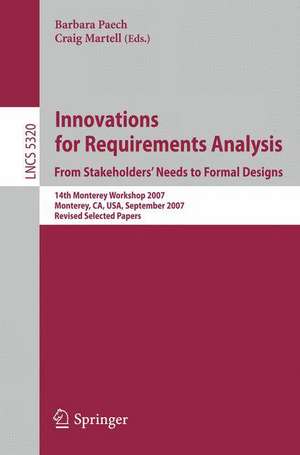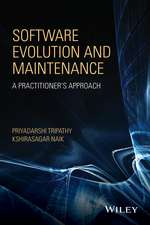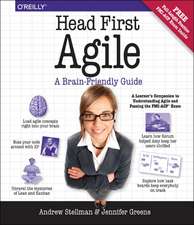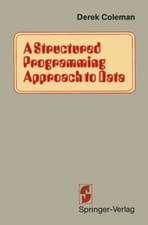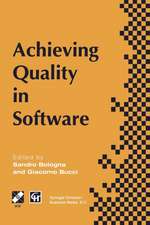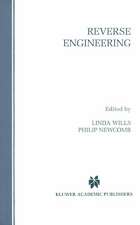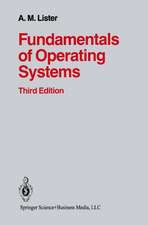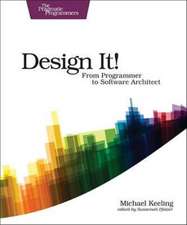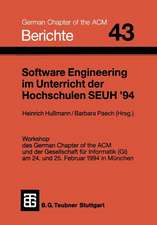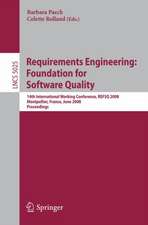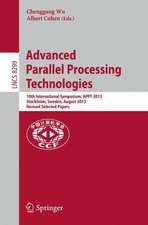Innovations for Requirement Analysis. From Stakeholders' Needs to Formal Designs: 14th Monterey Workshop 2007, Monterey, CA, USA, September 10-13, 2007. Revised Selected Papers: Lecture Notes in Computer Science, cartea 5320
Editat de Barbara Paech, Craig Martellen Limba Engleză Paperback – dec 2008
Din seria Lecture Notes in Computer Science
- 20%
 Preț: 1061.55 lei
Preț: 1061.55 lei - 20%
 Preț: 307.71 lei
Preț: 307.71 lei - 20%
 Preț: 438.69 lei
Preț: 438.69 lei - 20%
 Preț: 645.28 lei
Preț: 645.28 lei -
 Preț: 410.88 lei
Preț: 410.88 lei - 15%
 Preț: 580.46 lei
Preț: 580.46 lei - 17%
 Preț: 427.22 lei
Preț: 427.22 lei - 20%
 Preț: 596.46 lei
Preț: 596.46 lei -
 Preț: 449.57 lei
Preț: 449.57 lei - 20%
 Preț: 353.50 lei
Preț: 353.50 lei - 20%
 Preț: 1414.79 lei
Preț: 1414.79 lei - 20%
 Preț: 309.90 lei
Preț: 309.90 lei - 20%
 Preț: 583.40 lei
Preț: 583.40 lei - 20%
 Preț: 1075.26 lei
Preț: 1075.26 lei - 20%
 Preț: 310.26 lei
Preț: 310.26 lei - 20%
 Preț: 655.02 lei
Preț: 655.02 lei - 20%
 Preț: 580.93 lei
Preț: 580.93 lei - 20%
 Preț: 340.32 lei
Preț: 340.32 lei - 18%
 Preț: 938.83 lei
Preț: 938.83 lei - 20%
 Preț: 591.51 lei
Preț: 591.51 lei - 15%
 Preț: 438.59 lei
Preț: 438.59 lei - 20%
 Preț: 337.00 lei
Preț: 337.00 lei -
 Preț: 389.48 lei
Preț: 389.48 lei - 20%
 Preț: 607.39 lei
Preț: 607.39 lei - 20%
 Preț: 1024.44 lei
Preț: 1024.44 lei - 20%
 Preț: 579.30 lei
Preț: 579.30 lei - 20%
 Preț: 763.23 lei
Preț: 763.23 lei - 20%
 Preț: 453.32 lei
Preț: 453.32 lei - 20%
 Preț: 575.48 lei
Preț: 575.48 lei - 20%
 Preț: 585.88 lei
Preț: 585.88 lei - 20%
 Preț: 825.93 lei
Preț: 825.93 lei - 20%
 Preț: 763.23 lei
Preț: 763.23 lei - 17%
 Preț: 360.19 lei
Preț: 360.19 lei - 20%
 Preț: 1183.14 lei
Preț: 1183.14 lei - 20%
 Preț: 340.32 lei
Preț: 340.32 lei - 20%
 Preț: 504.57 lei
Preț: 504.57 lei - 20%
 Preț: 369.12 lei
Preț: 369.12 lei - 20%
 Preț: 583.40 lei
Preț: 583.40 lei - 20%
 Preț: 343.62 lei
Preț: 343.62 lei - 20%
 Preț: 350.21 lei
Preț: 350.21 lei - 20%
 Preț: 764.89 lei
Preț: 764.89 lei - 20%
 Preț: 583.40 lei
Preț: 583.40 lei - 20%
 Preț: 649.49 lei
Preț: 649.49 lei - 20%
 Preț: 341.95 lei
Preț: 341.95 lei - 20%
 Preț: 238.01 lei
Preț: 238.01 lei - 20%
 Preț: 538.29 lei
Preț: 538.29 lei
Preț: 329.58 lei
Preț vechi: 411.98 lei
-20% Nou
Puncte Express: 494
Preț estimativ în valută:
63.07€ • 65.98$ • 52.39£
63.07€ • 65.98$ • 52.39£
Carte tipărită la comandă
Livrare economică 02-16 aprilie
Preluare comenzi: 021 569.72.76
Specificații
ISBN-13: 9783540897774
ISBN-10: 3540897771
Pagini: 228
Ilustrații: XII, 215 p.
Dimensiuni: 155 x 235 x 12 mm
Greutate: 0.34 kg
Ediția:2008
Editura: Springer Berlin, Heidelberg
Colecția Springer
Seriile Lecture Notes in Computer Science, Programming and Software Engineering
Locul publicării:Berlin, Heidelberg, Germany
ISBN-10: 3540897771
Pagini: 228
Ilustrații: XII, 215 p.
Dimensiuni: 155 x 235 x 12 mm
Greutate: 0.34 kg
Ediția:2008
Editura: Springer Berlin, Heidelberg
Colecția Springer
Seriile Lecture Notes in Computer Science, Programming and Software Engineering
Locul publicării:Berlin, Heidelberg, Germany
Public țintă
ResearchCuprins
Abstracts.- Ambiguity in Natural Language Requirements Documents.- Towards Discourse Meaning.- Getting the Details Right.- Defect Detection and Prevention (DDP).- Papers.- Advances in Requirements Engineering: Bridging the Gap between Stakeholders’ Needs and Formal Designs.- Could an Agile Requirements Analysis Be Automated?—Lessons Learned from the Successful Overhauling of an Industrial Automation System.- Model-Driven Prototyping Based Requirements Elicitation.- A Case for ViewPoints and Documents.- Towards Combining Ontologies and Model Weaving for the Evolution of Requirements Models.- Reducing Ambiguities in Requirements Specifications Via Automatically Created Object-Oriented Models.- Innovations in Natural Language Document Processing for Requirements Engineering.- Logic-Based Regulatory Conformance Checking.- On the Identification of Goals in Stakeholders’ Dialogs.- Text Classification and Machine Learning Support for Requirements Analysis Using Blogs.- Profiling and Tracing Stakeholder Needs.
Textul de pe ultima copertă
This book presents the thoroughly refereed and revised proceedings of the 14th Monterey workshop, held in Monterey, CA, USA, September 10-13, 2007. The theme of the workshop was Innovations for Requirement Analysis: From Stakeholders' Needs to Formal Designs.
The 10 revised full papers included in the book were carefully selected during two rounds of reviewing and revision. These are preceded by the abstracts of the three keynote talks as well as a detailed introduction to the theme of the workshop, including a case study used by many participants to frame their analyses, and a summary of the workshop's results. The full papers have been grouped thematically under the headings Innovative Requirements Engineering Techniques and Innovative Applications of Natural-Language Processing Techniques.
The 10 revised full papers included in the book were carefully selected during two rounds of reviewing and revision. These are preceded by the abstracts of the three keynote talks as well as a detailed introduction to the theme of the workshop, including a case study used by many participants to frame their analyses, and a summary of the workshop's results. The full papers have been grouped thematically under the headings Innovative Requirements Engineering Techniques and Innovative Applications of Natural-Language Processing Techniques.
